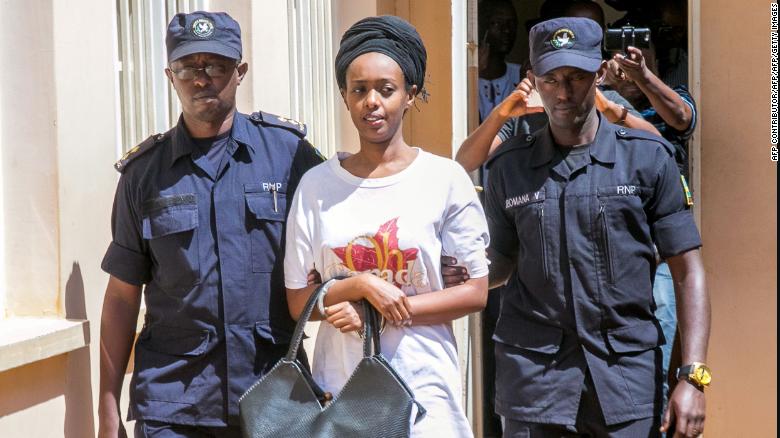Rwandan opposition leader stands by her innocence at long-awaited trial
Updated 1543 GMT (2343 HKT) November 7, 2018
CNN -- The high-profile trial of prominent Rwandan government critic Diane Rwigara and her mother concluded after five hours of proceedings in the High Court in the capital Kigali on Wednesday.
Rwigara, 37, is facing charges of incitement and fraud. Her 59-year-old mother, Adeline Rwigara, has been accused of divisionism and inciting insurrection. Both have long said that their charges are politically motivated.
Diane Rwigara was the sole female challenger in Rwanda's 2017 presidential election that Rwandan President Paul Kagame won with almost 99% of the vote. She had launched her campaign to run three months ahead of the election, but electoral authorities disqualified her, saying that she exaggerated the number of signatures needed to qualify and accusing her of submitting the names of dead people.
After she was disqualified, Rwigara launched the People Salvation Movement (Itabaza), an activist group, to "encourage Rwandans to hold their government accountable." Shortly after its formation, she was arrested on charges of incitement and fraud, charges she denies.
Read More
Rwigara's mother, Adeline, was also arrested based on private WhatsApp messages exchanged between her and her sister, who lives outside Rwanda. The prosecution had previously called those private chats -- in which Adeline and her sisters criticized the government -- "dangerous meetings."
They were detained in a Kigali jail for over a year until being granted release on bail in October.
In court on Wednesday, the pair stood firm in their resolve and proclaimed their innocence.
Diane Rwigara said that the forgery charges were fabricated as a way to block her candidacy, according to her official Twitter account. Rwigara also stood by comments she made in criticism of the government during a 2017 news conference.
Kagame, who has ruled Rwanda since 2000, has been widely credited with the nation's remarkable turnaround following the 1994 genocide. His fiscal and social policies are widely touted by supporters -- and many in the international community -- as a blueprint for success in the region.
Kagame's critics, including Rwigara, say that development has come at a cost to civil society and allege that the strongman has created an atmosphere of fear to crush all dissenting voices.
As an activist, Rwigara has questioned what she believes to be the suspicious deaths and disappearances of prominent businessmen, lawyers, journalists and a former intelligence official, among others. Groups such as Human Rights Watch and Amnesty International have highlighted those cases.
Rwanda's National Police and the office of the President have not responded to CNN's request for comment on those cases.
During the trial, Rwigara said that she stood by those remarks and said that cases of murders and disappearances "point to insecurity and fear," according to her Twitter account.
She added that Kagame's ruling party, the Rwandan Patriotic Front (RPF), has "penetrated all businesses and aspects of life," and invested in "vanity projects...to create a development facade to mislead the international community."
CNN has reached out to the Rwigaras for comment.
The prosecution is seeking a 22-year prison sentence for Diane Rwigara. They have requested a sentence of 22 years for inciting insurrection and 15 years for inciting divisions for her mother, local media Rwanda Today reported.
A verdict is expected on December 6.


